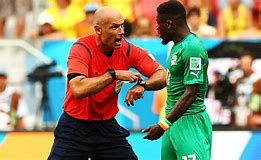The 2018 FIFA World Cup soccer championship match will be played Sunday between France and Croatia. Worldwide television viewership will reach billions. Advertising-related revenues from media coverage rights will fetch billions for FIFA.
Did you realize that the championship outcome may ride on a single referee wearing two watches?
That’s right! Soccer, which struggles to gain a significant level of interest in the United States, also struggles to accurately keep the time remaining in each game here in the year 2018.
For those soccer newbies (like me), here are some soccer time basics:
1. Two halves of 45 minutes each or 90 minutes for the game. However...
2. At the end of each half, the referee can add additional time to compensate for lost time during the half for substitutions, assessment of injuries to players, removal of players from the field of play for injuries, wasting time, and “any other cause” (For some reason, I am picturing a streaker here, but please use your own imagination).
3. Exactly how much time is added back at the end of each half for such “stoppage” time? Well, uh, it depends.
You see, one of the soccer referees keeps not one but TWO watches in an attempt to determine how much time was wasted in item #2 above. According to a soccer website, here is how it works:
“Fourth referees usually have two watches, one which he stops every time there is stoppage in play (such as injuries, substitutes, and goal celebrations) and another one which he runs to count the time spent in each stop.”
But wait, there’s more.
Let’s say that the referee determines that there are five minutes which should be added back to the game. Right as the half ends, a person standing along the sidelines will hold-up a sign-board which indicates the number “5”.
That means that both teams’ players should keep playing the game for another five minutes, right?
Sort of.
The same timekeeping referee also makes another critical decision. In the eyes of the timekeeping referee, five minutes can be anywhere between 5:00 and 5:59 in a soccer match!
Imagine this. Let’s say Sunday’s championship game has now passed the 90 minute mark, and the game is now in “stoppage time” of five minutes.
Now, let’s picture that France is running down the field with the ball and a chance to make the game-winning kick when the stoppage time reaches the 5:00 mark, the same timekeeping referee is allowed to use his judgment to allow the game to continue for up to the 5:59 mark. France scores the winning goal at the 5:58 in “stoppage time”.
In 2018, is it asking too much for soccer’s wealthy governing body to utilize a little technology to accurately track the time of its games?
Don’t get me wrong. I am a firm supporter that referees in all sports do a terrific job. I believe that the timekeeping soccer referee does his or her best to be as accurate as possible in keeping up with the precious seconds which should be added at the end of each half and, especially, at the end of the game.
I don’t know if this has ever happened before, but wouldn’t it be deliciously fitting for soccer’s version of Super Bowl Sunday to be decided during the arbitrary stoppage time and with a timekeeping judgment call being made by a well-meaning referee?
And the world wants to know why Americans have yet to embrace the game of soccer?
C’mon, FIFA! Time to change!

